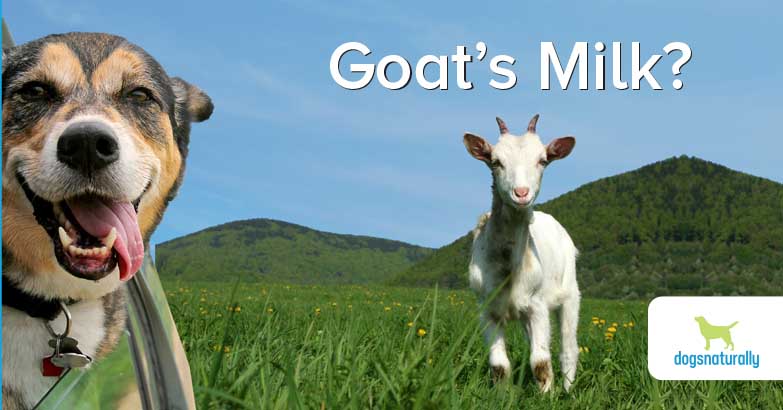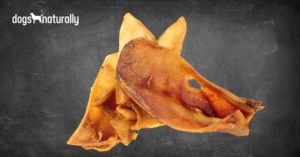Throughout history, people around the world have enjoyed fresh, raw and fermented milks. These come from a variety of animal species including goats. You may even be surprised to learn that goat milk (not cow milk) is actually the most consumed milk in the world.
And researchers have found that the composition of milk varies from species to species. So much so that goat milk may be a good choice when cow milk isn’t.
So today, I’ll talk about the pros and cons of goat milk and how to serve it to your dog.
Why Goat Milk May Not Be Right For Your Dog
There are 4 main reasons you may want to reconsider adding goat milk to your dog’s menu.
1. Lactose Intolerance
Before you start introducing any kind of dairy into your dog’s diet, you want to be sure she isn’t lactose intolerant.
Like humans, dogs can get digestive upset from dairy. This happens when their bodies can’t tolerate the milk sugar in dairy … called lactose. To break down these sugars, your dog needs a digestive enzyme called lactase. Unfortunately, not all dogs produce enough of this enzyme. This means they can get sensitivities and allergies to dairy.
If you aren’t sure whether your dog has an intolerance, introduce her to dairy slowly. Watch for adverse reactions and stop if you see any. Signs of lactose intolerance include:
The good news is, if your dog only has mild lactose intolerance, she may be able to digest goat milk better. That’s because goat milk has 12% less lactose than cow milk.
Goat milk also has other qualities that make it more digestible. I’ll explain this more when we talk about the benefits of goat milk.
2. Fat Content
As you know, cows milk packaging shows different percentages … usually 1 to 3%. This refers to the fat content of the milk.
Goat milk usually contains about 4% fat. That’s higher than the cow milk most people drink and most of this fat is also saturated.
People usually try to avoid overdoing saturated fat due to cholesterol concerns. This isn’t a concern for dogs as saturated fats don’t have the same effect on them. That being said, you want to balance the saturated and unsaturated fats in your dog’s diet. If you feed your dog goat milk, be sure to offset the saturated fat intake with healthy unsaturated fats.
You also want to watch the fat intake if your dog has (or is at high risk of) pancreatitis. Pancreatitis is inflammation of the pancreas and needs a lower-fat diet.
While it may seem like a good option to go with the low-fat or fat-free options, I recommend you avoid them. These products have been processed to remove the fat. So they can actually increase the risk of diabetes and obesity.
3. Higher Calories
Goat milk is higher in calories than cow milk. One cup of goat milk contains 170 whereas cow milk only contains 90 to 150 calories per cup.
If you’re feeding milk (goat or otherwise) to your dog, you’ll need to adjust her diet for the additional calories. This will help prevent you from overfeeding your dog and will reduce the risk of obesity.
4. Skin and Digestive Issues
Dairy products can be pro-inflammatory. Inflammation is one of the main drivers of skin and digestive problems. (In fact, it’s a driver of many chronic diseases.)
Milk has different properties that cause inflammation … including proteins, hormones and sugar.
Whey proteins in milk are one of the major contributors to inflammation. Both goat and cow milk have whey proteins, but goat milk has a higher concentration. And, when it comes to sugar content, goat milk has less than cow, but only 1g difference per cup.
So, if your dog is prone to chronic skin or digestive issues, it’s a good idea to skip dairy products completely.
Why Goat Milk Is A Better Choice Than Cow Milk
“Goat milk is the most complete food known.” – Journal of American Medicine
While dogs and humans do have different nutritional needs, there are similarities. And goat milk has many important vitamins, minerals, enzymes, protein and fatty acids.
Goat milk contains vitamins, minerals, electrolytes, trace elements, enzymes, protein, and fatty acids.
When compared to cow milk, goat milk is a better source of
- Protein
- Fat
- Phosphate
- Calcium
- Potassium
- Vitamin C
But that isn’t the only reason goat milk is a better choice.
1. Easier To Digest
I mentioned earlier that goat milk has less lactose than cow milk. But it turns out that lactose is not the only reason dogs (or people) can have sensitivities to milk. Goat milk actually has many unique properties that make it easier to digest than other kinds of milk.
The types of proteins found in goat milk are one of the major reasons it’s easier on the stomach.
There are two main types of proteins in milk …
- Caseins (make up about 80% of the total proteins)
Alpha-s1 casein is a major protein in cow milk. It can cause inflammation and is one of the many proteins that can cause your dog to have an allergic response. Goat milk contains low amounts of this protein, so it may be less likely to cause adverse effects.
You may have also heard of A1 and A2 milk. This refers to beta-casein proteins in cow milk. Regular milk is contains both proteins, whereas A2 milk only has A2 beta-caseins. It’s believed that A2 milk has more health benefits, including that it may be easier to digest. Goat milk only contains A2 beta-casein, which may contribute to its digestibility. - Serum proteins
Cow milk contains different beta-lactoglobulin and alpha-lactalbumin (whey proteins) than goat milk. This may also be the reason for any food reactivity your dog experiences.
The list of allergy-inducing proteins in cow milk goes on. Studies show it has more than 20 different proteins that can cause allergic reactions.
But it isn’t just proteins and lactose that make cow milk harder to digest. There are more reasons goat milk may be better tolerated than cow milk.
- Smaller fat globules in goat milk
- Higher concentrations of small and medium chain fatty acids
- A looser curd formation
All of this allows your dog to digest goat milk more quickly and with much less effort. In fact, the body can digest goat milk in 20 minutes. Having fat molecules one-fifth the size of those in cow’s milk makes it easily digestible … and it’s why even dogs with digestive issues may tolerate it.
2. Probiotic And Prebiotic
Probiotics are beneficial bacteria that improve your dog’s overall health. They may come from food or supplements. The live microorganisms travel through your dog’s digestive tract. If they survive the harsh conditions of your dog’s digestive tract, they’ll colonize in her colon.
Nearly 90% of your dog’s immune system is in her gut. So balancing good and bad bacteria is essential to your dog’s overall health.
But to do their job, these beneficial microorganisms need food. That’s where prebiotics come in. Prebiotics are undigested fibers that help beneficial bacteria grow and thrive.
According to the Raw Milk Institute, unpasteurized milk can be a source of probiotics. Goat milk also contains oligosaccharides, a common prebiotic. And it has six times more natural prebiotics than cows milk.
Fermenting goat milk to make foods like kefir and yogurt may also amplify the prebiotic content. That’s because the fermentation process can turn milk carbohydrates into oligosaccharides, which are a common prebiotic. But I’ll talk more about fermented milk later on … for now, let’s focus on unfermented goat milk.
3. More Calcium
Each cup of goat milk contains 330 mg of calcium. This is substantially higher than the 100 to 275 mg in a cup of cow milk.
Calcium is important for your dog’s neuromuscular, cardiovascular, immune and endocrine functions. According to Dr Ian Billinghurst …
“… every cell in the body depends on calcium to support enzyme functions, bodily signaling and to maintain cell membrane stability.”
RELATED: How to balance the calcium and phosphorus in a raw diet for dogs …
4. Better Nutrient Absorption
Copper and iron are trace minerals that are important to your dog’s overall health. Iron helps the body function properly and provides oxygen to your dog’s organs and muscles. Copper is needed to absorb iron and also stops anemia. (Anemia is a blood disorder that stops the body from getting enough oxygen).
Cow milk can interfere with how the body absorbs copper and iron. This is not the case with goat milk.
Researchers studied the copper and iron absorption rates of rats drinking goat milk. They found it was similar to those who had no milk at all. This can help reduce the risk of malabsorption.
Goat milk can also improve the digestibility of magnesium and phosphorus. These are important minerals that help with bone growth as well as other functions.
When Goat Milk Is A Definite No
The decision on whether you want to give your dog goat milk is up to you. But there are definitely times you’ll want to avoid it.
1. Your Dog Has Itchy Skin Or Digestive Issues
The first reason I’ve already mentioned. If your dog is prone to digestive or skin issues, it’s best to skip the dairy entirely.
2. Your Dog Has Cancer
Whether raw or fermented, dairy contains proteins that are proinflammatory. Inflammation is a major cause of cancer, so it’s best to avoid any food that could cause it.
3. Your Dog Is Obese Or Has Pancreatitis
If your dog is overweight or suffers from pancreatitis, the fat in goat milk may be unsuitable for her.
4. Your Dog Is Intolerant
While goat milk can be easier to digest for some dogs, if your dog’s sensitive to dairy she may still have trouble. If you want to try it … start with very small amounts to avoid upsetting your dog’s stomach.
Fermented Goat Milk
There’s one last topic I want to cover before I talk about how much goat milk your dog should get … and that’s fermented dairy.
Fermentation can add another layer of nutritional value. Fermenting milk creates products like kefir and yogurt.
Although people have been using fermented milk and dairy foods for thousands of years … we’ve only recently begun to understand how they help fight modern chronic illnesses such as:
- Arthritis
- Irritable bowel syndrome
- Gastric ulcers
- Colitis
- Intestinal pathogens
- Brain disorders
Many people use fermented foods because they’re touted as a good source of probiotics. But this isn’t entirely correct. There are probiotics in fermented foods but they’re fragile strains that can’t survive the journey through your dog’s digestive tract.
That means that they’re already dead by the time they get to your dog’s colon. So they can’t colonize and provide the probiotic benefits. But fermented foods are still good for your dog … they’re just good for a different reason.
Fermented foods are full of prebiotics that feed the beneficial bacteria in your dog’s gut. They also contain postbiotics that are created during the fermentation process. Postbiotics are metabolites that deliver health benefits. One of the most important postbiotics is short-chain fatty acids (SCFAs) that …
- Stop harmful bacteria from growing
- Keep the cells of your dog’s gut lining tight together to prevent leaky gut
- Boost the immune system
- Reduce inflammation
Adding raw fermented milk to your dog’s diet can also provide:
- Enzymes
- Probiotics
- Powerful antioxidants
- Essential fatty acids
- Concentrated vitamins (such as essential vitamin K2)
- Trace minerals
… all in a live, whole food form.
Fermented dairy products are also easier for most dogs to digest. They provide enzymes to help with nutrient absorption.
RELATED: Why dogs need fermented vegetables [with recipe] …
Make Your Own Kefir
You may be able to find a high quality fermented goat milk or kefir in your local health food store or online. You can also make your own goat milk kefir at home.
Making kefir is surprisingly simple …
Cheeseslave has a great instructive blog post on how to make kefir at home. You can buy kefir grains online, and if you take care of the culture, it should last indefinitely.
Making kefir from raw organic dairy products is ideal, but if you don’t have access to raw dairy, you can use full-fat dairy, preferably from grass-fed animals. You also want to buy organic products whenever possible. Otherwise, you could be feeding your dog toxic additives, like glyphosate (a known carcinogen).
RELATED: How glyphosate is getting into your dog’s food …
When To Avoid Fermented Foods
If your dog has a yeast infection, avoid giving her fermented foods.
For food to ferment, bacteria and yeast “eat” the carbohydrates and sugars in the food. So, the prebiotics that feed the yeast in the fermented food will also feed the yeast in your dog’s gut.
You may think you’re helping your dog by feeding healthy fermented foods. But it can often make skin conditions like yeast worse.
How to Give Your Dog Goat Milk
As you can see, goat milk has many pros and cons. If you do decide to give goat milk a try, be sure to buy a good quality product.
The nutritional value of goat milk depends on the diet and overall health of the goats in comes from. You’ll get much better quality milk from goats that are …
- Organically raised
- Pastured and grass fed
- In a low stress environment
- Free of antibiotics
- Free of GMO feeds
You also want to look for raw goat milk. It’s the best choice because it’s not processed and is rich in lactase enzyme. Processing like pasteurization or spray drying lowers the nutritional value of the milk. And it destroys the lactase enzymes found in the milk. Many people and pets who don’t produce the lactase enzyme can’t digest pasteurized milk. But they can digest raw milk without problems.
Some people may argue that raw milk has pathogens. But like any food, the quality is only as good as the source. If you buy raw milk from a reputable source, the risk is greatly reduced.
If you use fermented goat milk or kefir, make sure it’s made from raw milk. Lactic acid bacteria will thrive best on unadulterated milk … that hasn’t been damaged by excessive heat. The probiotics in raw goat milk are also less likely to be destroyed in the digestive tract … by hydrochloric acid and bile salts in digestive juices.
Serving Size
Less than 20 lbs … 2 oz per day
20 to 50 lbs … 4 oz per day
50 to 80 lbs … 8 oz per day
80 lbs or more … 10 oz per day
If this is your first time giving your dog goat milk or dairy, start slow. Work your way up to the recommended amount. Watch for any signs of digestive upset and intolerances and cut back or stop if necessary. And don’t forget, if you add goat milk to your dog’s meals, you want to reduce your dog’s food to offset the goat milk calories. If you’re feeding commercial raw, 1 oz of food is usually about 60 calories. This is equal to about 3 oz of goat milk.
Goat milk does have its benefits but it isn’t nutritionally necessary and … in some cases it can make health problems even worse.
Take your time when deciding whether goat milk is something your dog needs. Consider all of the pros and cons.
References
Ebaid H, Salem A, Sayed A, Metwalli A. Whey protein enhances normal inflammatory responses during cutaneous wound healing in diabetic rats. Lipids in Health and Disease. 2011 Dec 14;10:235.
Álvarez-Rosales JD, Ozuna C, Salcedo-Hernández R, Rodríguez-Hernández G. Comparision of antioxidant activity of cow and goat milk during fermentation with lactobacillus acidophilus. Intechopen. 2019 Sep 29.
Agamy EI. The challenge of cow milk protein allergy. Small Ruminant Research. 2007 Mar;68(1-2):64-72.
Leong A, Zhiqian L, Pillidge C, Zisu B, Rochfort S, Gill H. Naturally occurring bioactive oligosaccharides in goat’s milk-infant formula . Current Developments in Nutrition. 2019 June;3(1).
Garcia-Burgos M, Moreno-Fernández J, Alférez MJM, Díaz-Castro J, López-Aliaga I. New perspectives in fermented dairy products and their health relevance. 2020 Sep;72.












